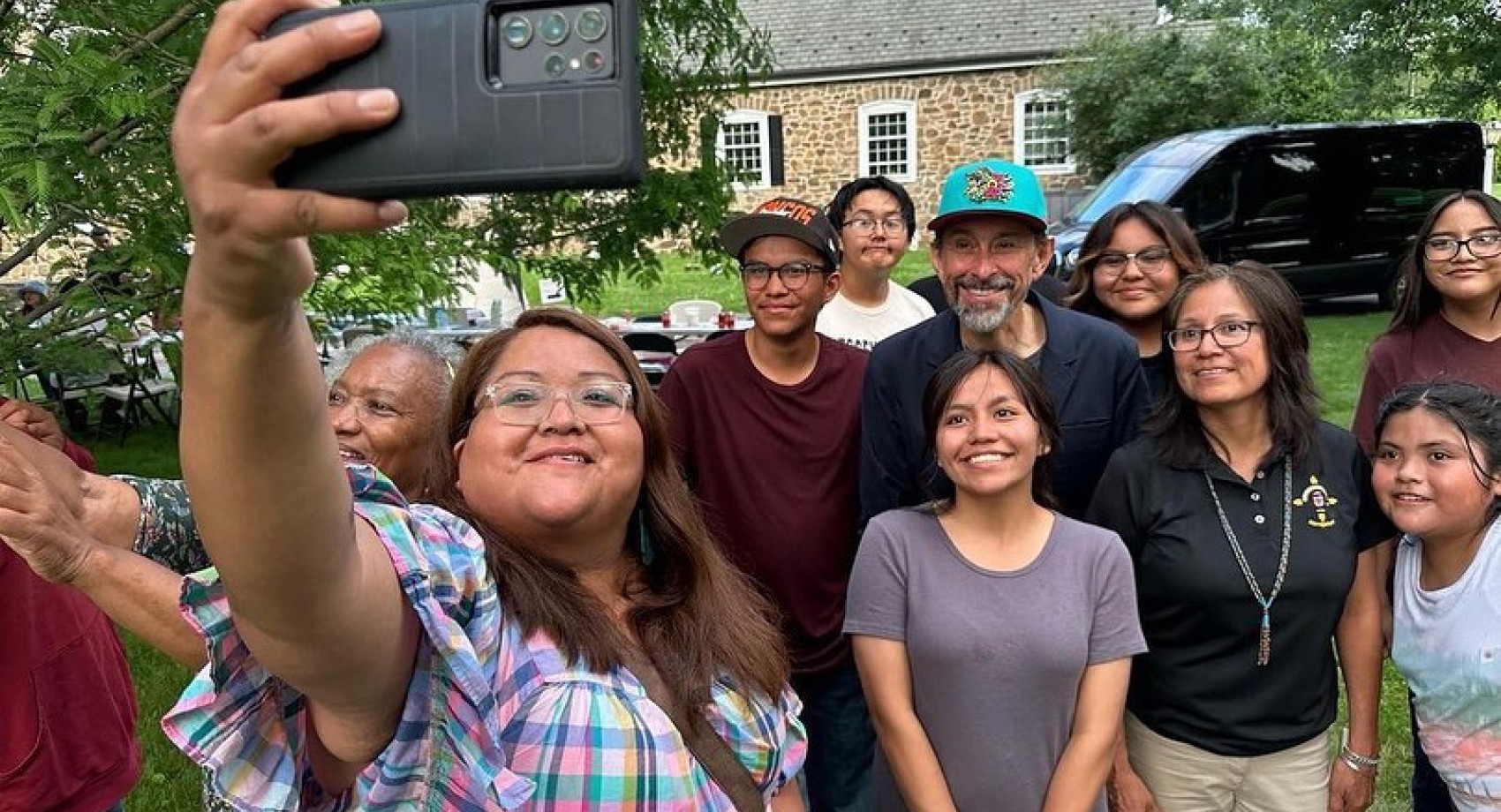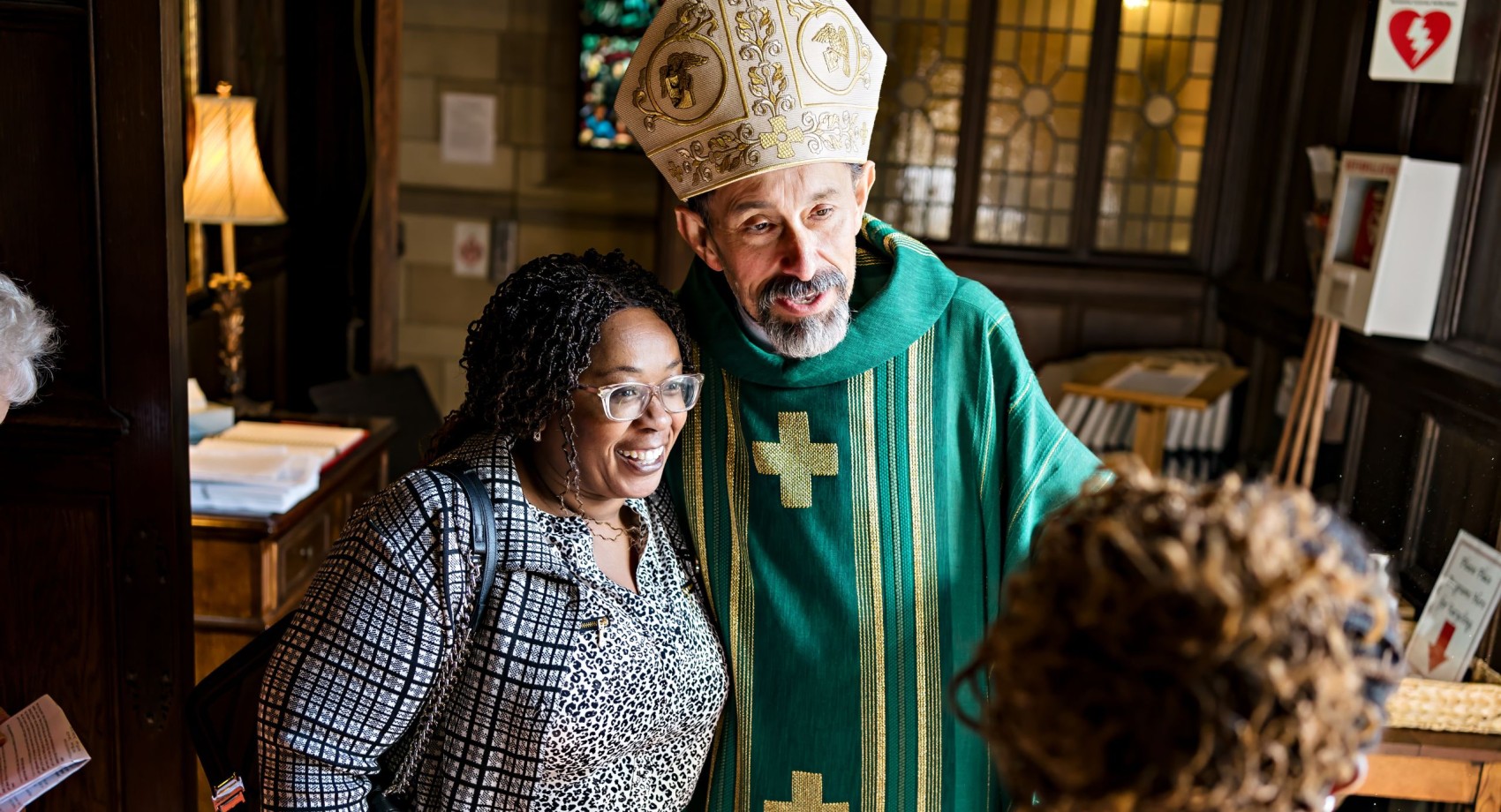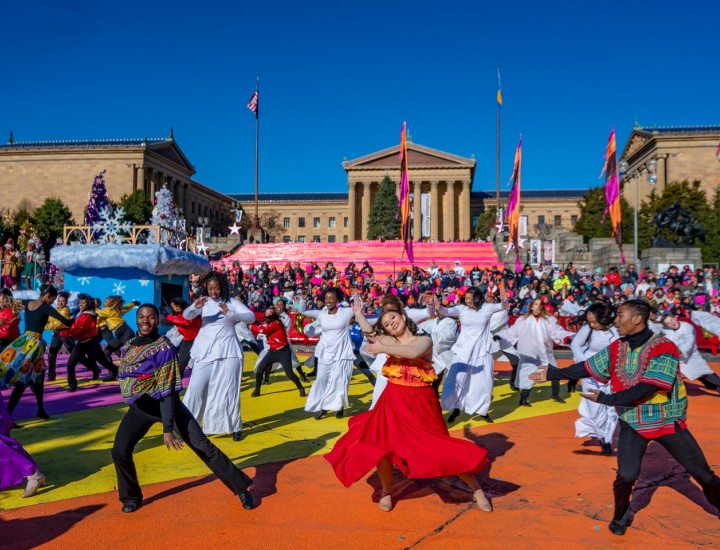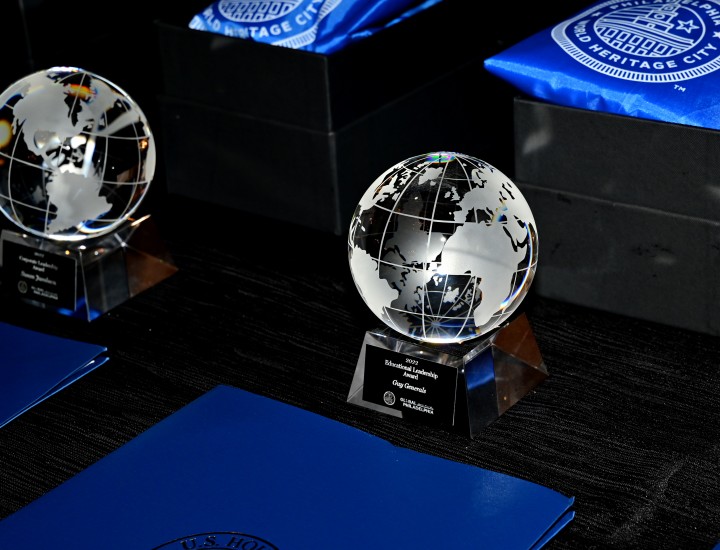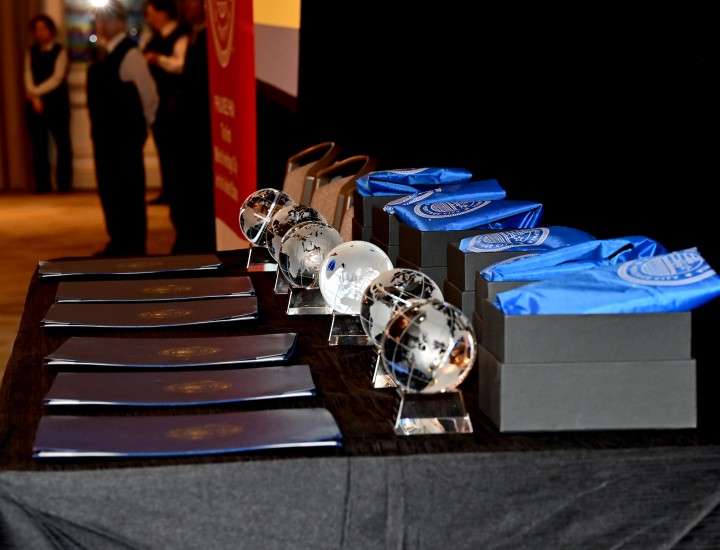A Global Conversation with the Rt. Rev. Daniel G. P. Gutiérrez
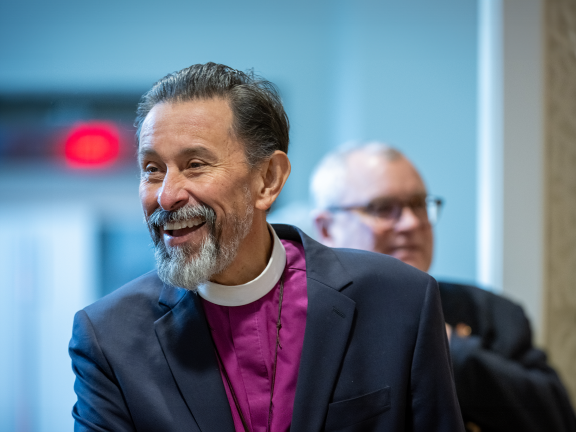
As the 16th bishop of the Episcopal Diocese of Pennsylvania, the Rt. Rev. Daniel G. P. Gutiérrez has made reforming the church and connecting with the community his mission. With experience in politics and government, as well as teaching as an adjunct professor at the University of Mexico, Gutiérrez learned many valuable lessons before becoming a bishop. After being in this role for more than seven years, he has created new plans for community outreach and involvement in the church.
The Bishop and the diocese are also deeply invested in the Anglican Communion and engaged with the work of the Archbishop of Canterbury and the Anglican Consultative Council to engage in ministry on a global scale. The bishop also holds many chair and board positions; he is President of The Compass Rose Society and chair of the Board of Trustees for Episcopal Community Services, The Church Foundation, and the Clergy Assurance Fund of Pennsylvania, among many others.
The weekend before the Global Conversation interview, Bishop Gutiérrez and his team hosted the Diocesan Convention for the Episcopal Diocese of Pennsylvania, at which the Bishop was able to share his plans for the diocese in the coming years and exemplify the hard work they have done thus far. In the wake of this successful convention, GPA had the opportunity to discuss Bishop Gutiérrez’s perspectives on his work and the role of the church. GPA is awarding Bishop Gutiérrez with the Globy Award for Community Leadership at this year’s Globys.
Madi Costigan: You are receiving the Globy Award for Community Leadership. How would you describe your leadership style?
Bishop Gutiérrez: Well let me preface it; I really hate the word leadership because to me it’s egotistical - it takes a community to work together. So, in the church, I always use being a shepherd, because there's a difference. At times a shepherd leads from the front, walks in the middle, and often is at the rear.
It starts with getting the right people, seeing the unique talents and gifts that people have. When it comes down to it, it’s not the person who holds the title that does it, it’s everyone else. People talk a lot about vision. You set out where you want to go but there always has to be a “why.” I think a lot of people don’t express the “why.” When I came in, this was a very broken diocese, with a lot of difficult troubles. The after effect becomes systemic and then people don’t trust. So, I spent my first year just going out and listening, I couldn’t come in as an outsider and say, “this is where we're going because this is my vision.” I spent my time listening and I heard their hopes, their dreams, their fears, their pain. I had to establish trust, because you can't be with people and cast the supposed vision without listening, without trust, without the right people, and without the “why.” I believe it begins with getting to know who you're with and getting the right people, and once you do that, you teach why we’re doing this.
And then I’m the type that says “Go.” I'm not a micromanager. It’s always the details: if you can't take care of the small things you can't take care of the large things. Proper preparation prevents poor performance; you have to learn. And I tell them, “give yourself permission to fail. Fail, fail often, fail daringly, because if we're not failing, we’re not trying.” The only type of failing that I do not put up with is if you keep repeating the same mistakes; it means you don’t care or this is not important, and then you don’t belong here. You have to throw everything into it. And I tell them this isn't a job, it's a calling; you're called to do this type of ministry.
I just give people the latitude, not to say I don't hold them accountable and I’m not demanding; I'm all that stuff because I approach things and serve with leadership, and it's not for me, it's for all of them. If we let down the people we serve - if we don't return a phone call or an email - it breaks trust. And once you break trust, it's hard to get it back.
In the context of Philadelphia, what are some unique challenges but also rewarding experiences you have had around Philadelphia?
Philadelphia is a wonderful city and I love that the city really knows who they are. It’s a city of communities; when I say Philadelphia I’m not just talking about Center City; my diocese is the five surrounding counties. They know who they are and I like that. And the opportunities here are extraordinary for people. That doesn't mean we overlook the glaring problems such as childhood hunger, gun violence, and racism that still exist structurally. In terms of community, I love the identity, the opportunity and the ability to be who you are.
GPA is invested in bringing people and communities together, across Philadelphia and across the world. What role do you believe institutions such as churches and nonprofits play in encouraging connection among people and communities?
With churches, before you have a connection there has to be the encounter. People don't connect without being present, and presence is a very important thing. Nonprofits and churches are supposed to be present in the community, not just have people come in but we go out and meet people where they are in life. That is the beauty of church- the encounter with one another.
Take Jesus. Most people think that he did these grand things with lots of people but most of his interactions were one-on-one with people, that individual encounter, and then they came away transformed because of it. Then it’s a lifelong connection based on the encounter, and I always try to model that. I think the church has become two institutions and it has forgotten that we have to be present in the world and meet people where they are. Just be present. We have mastered the art of talking but we have lost the sacrament of listening. Our idea of listening in today’s society is forming our arguments while the other person speaks, that’s not listening.
When you make the encounter and connection, it’s beautiful when you live for something more than yourself. In the West, we have developed this culture of indifference. That is, I think, our greatest challenge, that it has become “me” and not “we.”
I have also learned that you are committed to the global ministry of the Anglican Communion. Can you tell me more about your involvement in that?
Community doesn't just mean where we live. I’m President of the Compass Rose Society, which gives the Archbishop of Canterbury his outreach to the world. Scientifically, we are 99.999% identical, every human being, we are basically identical twins. But we always put people into the “Other:” the other country, the other political party, and everything else. Think of all the pain we have caused because of that .001% difference, which comes down to race, etc. But if we think of humanity, we have no differences. Most people in this world are seeking the same things: joy, peace, security, family, belonging. There is this thing that should supersede everything else; it’s called humanity.
Everyone is someone’s mother, father, son, daughter, brother, sister, but we don't look at it that way. We look at it in a closeted way. If a person is suffering, it's our call to help. I don't care about political programs, we’re the church so I'm speaking from that perspective. We can make a difference in the name of love. Our responsibility doesn't end here, it goes throughout the world.
You have a background in politics, so how have you merged that or learned from that in your role in the church?
You can't have a book without the first few chapters, or else it's not a complete book that tells a story. I spent, I think, more of my life in government and politics than I have in ministry; I came in relatively late. My career in politics and government prepared me for this. In this institution, there are politics to deal with on an international stage. I use it in a good way in trying to find solutions. I really believed when I was in politics, public service meant something, and service is the basis of any person in a position such as mine. You seek the common good and find a way, it’s not winner-take-all, so that's what I learned back when there was an idealism to politics and a hope for politics and public service, that government is not the enemy, that government can help.
It just helps me try to find a way. Any organization is a human institution, and humanity is broken in many ways, we all have our faults. It takes that balance in trying to find a way without creating the “Other” or the enemy or the opposition. Even when I hold my parliamentary procedures, I refuse to say “against,” because I believe in the church, there is no one against each other. You can have a contrary mind and a difference of opinion, but when you're against, it sets a different tone. I hate the signs that say "The Episcopal Church welcomes you," because it says that this is my home, you can come in, but it should be the place where you belong. You belong with us, and belonging makes it a home and denotes something different.
I understand that you are a very busy individual with overseeing the diocese and holding numerous chair and board positions. What does a typical day as Bishop look like?
A lot of it is internal. I am good at management but I try to set the direction and empower people. My preference would be to be out among the people all the time as a shepherd. I have tried to structure each day because the only thing I have complete control of in a position like this is my calendar. I work constantly, I am built for it and that's the way I've always been. I try to structure time because I'm very particular about my sermons. I'm obsessive- I don't just write them or make them up. I believe if a person is subjected to sitting and listening to me for however long, I need to give them food for the journey. I am trying more and more to get out, I am trying to create structure, but I would prefer to be out 95% of the time.
What do you think your goals in the coming years are, where do you see the diocese going in the next few years?
Out in the world. I really do. At this past [Diocesan] Convention, I laid out where I would like this diocese to go. One, I want us to be a different church. Church is not the building. Church is the people, the body of Christ. It doesn't matter how big or small, that's church to me. We've replicated so much of the institution and administration that we have forgotten who we were, and I think that's why the youth are not paying attention to the church. The younger generations can tell who are hypocrites, and if we’re not living the Gospel, then what reason do you have to come to church? We’re not a political party or a social club based on a religious ideal, we’re the church, called to something different. I want to do things people don't expect. One of the initiatives I am most excited about involved recently released felons. If they are not helped within four months, they can fall back into the same old patterns. I want to replicate what Father Greg Boyle is doing at Homeboy Industries in LA, actually holding them accountable, bringing them in, providing them job training, and creating businesses based on them. There are a lot of people who come in and the church hits them over the head with a Bible, and that doesn't do it. People are seeking more in their lives. What does the community need?
There are families that have a child with autism who feel they cannot worship because they're so worried about their children being in that setting. So why don't we have a church specifically for families for children with autism, that’s dedicated for families that are differently-abled, and we make it all accessible, so they don't feel like they're different. No one should have to fit in at church.
There are people who love animals, I’m one of them, so we're creating, not a church, it's not that structure, but just calling it a church and building a community around their animals. I believe you get people there, create a community, and the Holy Spirit takes over. It’s not us, it’s God and I’m not at that pay level. We are also building programs that take the administrative stuff off our churches. We are planning twelve house churches. You come in, it's centered around a meal, you have conversation, and maybe there's scripture, but nothing formal. But you create that community and again, let God take over and not try to force it.
We’re doing all those things to create community. Community first because I believe the essence is that God’s always at the center of it. You always have dreams about what your new job is going to look like with grand ideas. I learned relatively quickly when I got here and listened that my job is not to build great things. My call is to be a laborer in the field, and that's hard work. It’s not for me, it's for the next generation of faithful Christians and bishops who will share in the abundance. It’s our work that's going to allow that to be sustainable.

